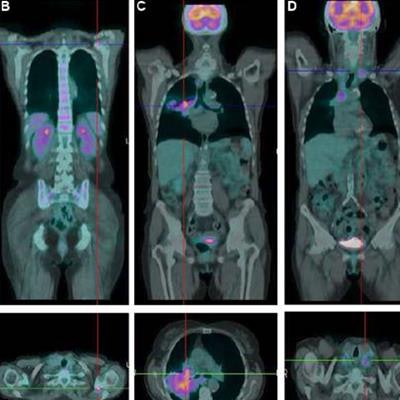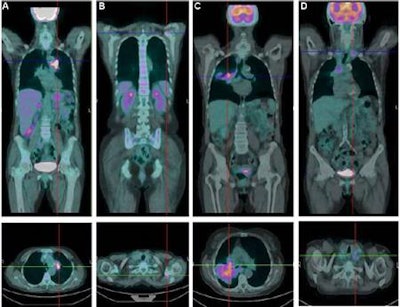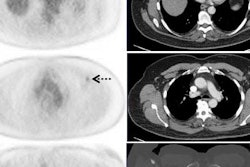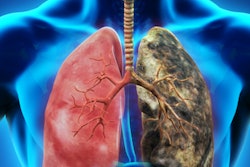
Using FDG-PET/CT, researchers in Italy have found a correlation between cell-free tumor DNA circulating in the bloodstream and the aggressiveness of tumors in patients with advanced non-small cell lung cancer (NSCLC), according to a study published in the November issue of the Journal of Nuclear Medicine.
Lead study author Dr. Silvia Morbelli, PhD, from the IRCCS San Martino-IST National Cancer Research Institute in Genoa, and colleagues suggest that cell-free DNA might better reflect the biological behavior and aggressiveness of tumors than tumor burden in metastatic NSCLC (JNM, November 2017, Vol. 58:11, pp. 1764-1769).
The study included 24 men and 13 women between the ages of 51 and 80 years who had never been treated with chemotherapy. Morbelli and colleagues found a direct correlation between the amount of cell-free DNA and tumor metabolism -- but not with metabolic tumor volume.
 Coronal and transaxial sections of an FDG-PET/CT scan of a 73-year-old woman with stage IV NSCLC show a primary lesion (A) with highly concentrated FDG in the left lung and a small bone lesion in the left scapula (B). An FDG-PET/CT scan of a 70-year-old man with stage IV NSCLC shows a primary lesion (C) with moderately concentrated FDG in the right lung and multiple mediastinal and cervical lymph nodes (D). The female patient (A, B) had lower tumor burden but higher SUVmax than the male patient (C, D). Image courtesy of JNM.
Coronal and transaxial sections of an FDG-PET/CT scan of a 73-year-old woman with stage IV NSCLC show a primary lesion (A) with highly concentrated FDG in the left lung and a small bone lesion in the left scapula (B). An FDG-PET/CT scan of a 70-year-old man with stage IV NSCLC shows a primary lesion (C) with moderately concentrated FDG in the right lung and multiple mediastinal and cervical lymph nodes (D). The female patient (A, B) had lower tumor burden but higher SUVmax than the male patient (C, D). Image courtesy of JNM.The researchers also reported that a subgroup of 13 patients with metabolically active bone lesions had higher levels of cell-free DNA. While cell-free DNA correlated with tumor metabolism, no association was found with circulating tumor cells.
"Our findings illustrate the prognostic value of F-18 FDG and provide a deeper understanding of clinically reliable, noninvasive biomarkers that may help identify potential unresponsive NSCLC patients before treatment and limit unnecessary toxicity," Morbelli said.




















